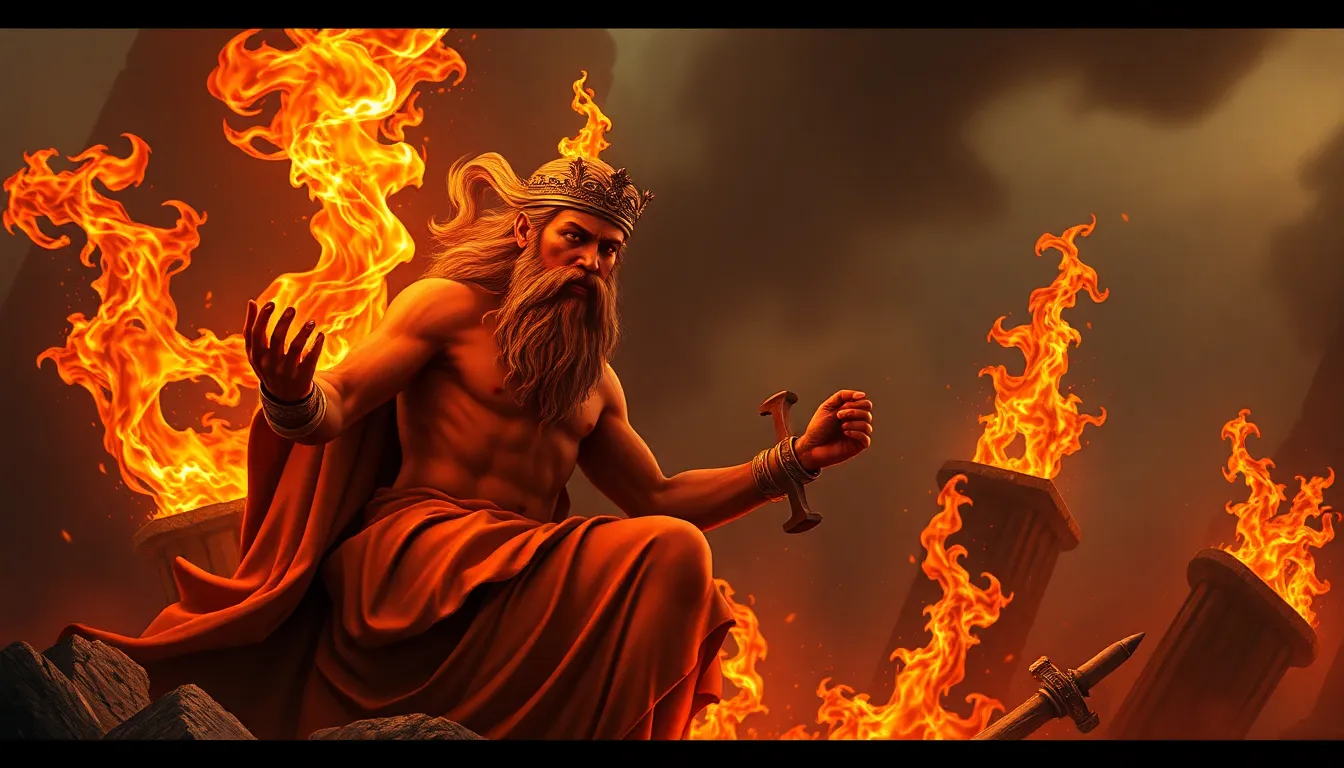The Myth of Hephaestus: The God of Fire and Craftsmanship
I. Introduction to Hephaestus
Greek mythology is a rich tapestry of stories and deities, each playing a crucial role in the ancient Greek understanding of the world. Among these divine figures, Hephaestus stands out as a pivotal character, revered as the god of fire and craftsmanship. His unique skills and attributes highlight the importance of creativity and labor in ancient Greek culture.
Hephaestus represents the union of artistry and practicality, embodying the spirit of innovation and the transformative power of fire. Fire, a vital element in both daily life and myth, symbolizes both creation and destruction, reflecting the duality of human experience.
II. Birth and Origins of Hephaestus
The origins of Hephaestus are steeped in myth, with various accounts detailing his birth. Some sources claim that he is the son of Zeus and Hera, while others suggest that he was born solely from Hera, who desired a child without the involvement of her husband. This latter account speaks to Hera’s strength and independence, as well as the complexity of divine relationships in Greek mythology.
Hephaestus’s physical appearance is often described as less than divine; he is typically depicted as lame and deformed. This disability sets him apart from his more glamorous counterparts in Olympus. His early life experiences, marked by rejection and isolation, profoundly influence his character, fostering a sense of resilience and ingenuity.
III. Hephaestus’s Role Among the Gods
In the hierarchy of Olympus, Hephaestus occupies a unique position. He is often depicted as the craftsman of the gods, responsible for creating magnificent artifacts and weapons. His relationships with other deities are complex; he is both respected for his skills and marginalized because of his physical appearance.
One of the most significant aspects of Hephaestus’s life is his marriage to Aphrodite, the goddess of love and beauty. This union, while seemingly ideal, is fraught with challenges, as Aphrodite’s infidelity with Ares, the god of war, brings themes of betrayal and conflict into Hephaestus’s life. His response to these challenges further shapes his character and legacy.
IV. Hephaestus as the God of Fire
Hephaestus is intrinsically linked to fire, a powerful symbol in mythology and craftsmanship. Fire represents not only the destructive forces of nature but also the creative potential inherent in human endeavor. Hephaestus’s forge, a place where raw materials are transformed into exquisite creations, embodies this duality.
- Creation: Fire is essential to forging tools and weapons, signifying innovation and progress.
- Destruction: Conversely, uncontrolled fire can wreak havoc, illustrating the potential dangers of creativity when misapplied.
In mythological depictions, Hephaestus’s forge is often described as a magnificent and industrious place, filled with the sounds of hammer striking anvil and the glow of molten metal. This imagery reinforces the idea that craftsmanship requires both skill and the raw power of fire.
V. Master Craftsman and Artisan
Hephaestus is celebrated as a master craftsman and artisan, responsible for a plethora of remarkable creations. His works include:
- Weapons and armor for the gods, including the famous shield of Achilles.
- Intricate tools and mechanical devices, such as the golden robots that served the gods.
- Mythical beings, like Pandora, the first woman created by the gods, who brought both beauty and strife to humanity.
The role of craftsmanship in Greek society cannot be overstated. It was seen as a divine gift and a source of pride, and Hephaestus’s creations symbolize the pinnacle of artisanal skill. Through his work, he not only served the gods but also reflected the values of hard work, creativity, and innovation that were esteemed in ancient Greek culture.
VI. Myths and Legends Involving Hephaestus
Hephaestus is woven into numerous myths that illustrate his significance and the themes of betrayal and redemption. One notable myth involves Prometheus, the titan who stole fire from the gods to give it to humanity. As punishment for this act, Zeus ordered Hephaestus to create Pandora, a figure who would bring both hope and hardship to mankind.
Other tales showcase Hephaestus’s ingenuity, such as the creation of golden robots to assist him in his forge. These stories highlight not only his craftsmanship but also the complex interplay of divine relationships and the consequences of actions within the pantheon.
VII. The Cultural Legacy of Hephaestus
The legacy of Hephaestus extends beyond the confines of ancient mythology. His representation in art and literature has evolved over centuries, influencing how gods and craftsmanship are perceived in modern culture. In classical art, Hephaestus is often depicted as a robust figure working diligently at his forge, symbolizing the ideal of the skilled artisan.
In contemporary culture, Hephaestus’s legacy continues to thrive. He appears in various forms in:
- Films, such as adaptations of Greek myths that explore his character and relationships.
- Literature, where he is often portrayed as a misunderstood genius or a tragic figure.
- Art, where modern interpretations of Hephaestus reflect ongoing themes of creativity and labor.
This enduring representation underscores the relevance of Hephaestus’s myths, emphasizing the timeless connection between creativity, labor, and the divine.
VIII. Conclusion
In conclusion, Hephaestus holds a significant place in Greek mythology, embodying the complex interplay of creativity, craftsmanship, and the human experience. His stories of resilience in the face of adversity, his mastery of fire, and his intricate creations serve as a testament to the value placed on labor and artistry in ancient Greek culture.
As we reflect on the enduring nature of myths, it becomes clear that they continue to resonate with contemporary audiences. The tales of Hephaestus remind us of the importance of creativity in our lives, the value of hard work, and the profound connection between humanity and the divine. Through these narratives, we explore our own struggles and triumphs, finding relevance in the ancient wisdom that still guides us today.




